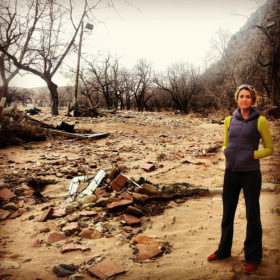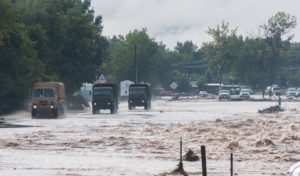
When Clark students graduate they anticipate setting out on a new life, one involving a career, perhaps a family. They don’t expect to be tested by a natural disaster.
Unfortunately, in September, Rebecca Louzan ’08 learned that life isn’t predictable. Heavy rains and broken dams resulted in flooding that turned Lyons, Colorado — where she has lived for three years — into an island, and wiped out 20 percent of its housing. The entire town was evacuated and left without electricity for more than four weeks; other utilities, including water, sewer and gas, still have not been turned back on in some areas. Louzan is helping to organize volunteers and ensure that the rebuilding effort doesn’t lag as time passes.
Watch a short video about the flooding in Lyons.
“Crazy weather happens sometimes in Colorado,” Louzan says, though no one anticipated the scope of the flooding. While her own house was untouched by the water, she saw other residents lose everything. All of the town’s businesses were forced to close, and their future is uncertain. Some access roads through Lyons are still not open for business traffic.
When the emergency sirens (usually used for tornado warnings) sounded at 2:30 a.m. on Sept. 12, Louzan watched from her deck as river waters breached their banks. People living in the river area were evacuated, moved to higher ground or left the town. Over the next 24 hours, evacuation orders went from one area of town to another as the waters rose even higher and the town was isolated from surrounding areas. Several parts of Lyons — including one called the confluence area because it sits where the North and South St. Vrain creeks meet — were completely devastated.
The confluence area is just below where Louzan lives. “They don’t know if their houses can be rebuilt or if the town will allow it for safety purposes,” she explains. “We’ve learned that the flood plain as we understood it was not accurate. My understanding is that when our area was settled, the flood plain was rerouted for agricultural purposes — but nature had a different plan for where the flood would go.”

Ultimately, access roads to and from Lyons were flooded or washed away, and even the National Guard couldn’t reach the town for a few days. In the first 24 hours, Louzan says, people relied heavily on Facebook to communicate. The town’s administrators used the official Lyons page to keep citizens informed, and residents posted messages offering places to stay or looking for help.
After the first day, electricity and other utilities went out, computers and phones died, and using social media to communicate was no longer an option. Louzan credits Lyons’ leaders for getting the word out about morning “meetings” at a town park, where they would make sure people were informed and safe. “Our town administration, firefighters, law enforcement, all brought this real sense of calm and organization into a very scary time for us. I’m learning so much about leadership excellence from these individuals.”
Eventually Louzan evacuated for a few days, yet as a Lyons business owner she was able to get back into town during the day (through a National Guard brigade). Her Lyons Yoga and Wellness studio was undamaged in the flood but business was not possible because of the disaster. In the days following the disaster she opened her doors for emergency personnel and residents. Practitioners from around the area came in to give free massages and bodywork to those who were working to keep the town safe. Louzan and others began helping residents clean up the mud and salvage belongings from destroyed homes.
The Lifebridge Christian Church in nearby Longmont served as the evacuation center for Lyons residents and also provided many volunteers to help begin the rebuilding process. “They adopted us,” Louzan says. “I can’t express the gratitude that I and my town have for these folks. And there is a man in our town who jumped in with a shovel the first day of the flood and pretty much has not put it down two months later.”
And now, with much work still to be done, the Lyons community is stepping up. “We’re trying to create a volunteer organization that’s sustainable,” she says, noting that there are currently hundreds of volunteers, a number that could wane over time. Volunteer work is beginning with the demolition of mold-infested structures and will expand to rebuilding homes, business buildings and parks.
Some residents have been allowed to return to their homes to start rebuilding, while some don’t know when — or if — they’ll be able to come back. Louzan says the grief is palpable as some people celebrate being back in their homes for Thanksgiving while others don’t know if they have a home at all.
Which brings Louzan to her Clark training. A double major in psychology and molecular biology, she studied the social constructs of grief while an undergrad. “I’ve felt prepared to deal with the mental process of dealing with this, and I believe Clark has a lot to do with that,” she says. She adds that what she and her fellow Lyons residents are doing is truly “challenging convention.” They are creating a way to deal with a disaster, and hope to be able to share their knowledge with other communities facing similar hardships.
Louzan is involved in the recovery efforts for Lyons and in the creation of Lyons Fights Back. “Progress is being made,” she says, “but it’s hard for people to realize that recovery doesn’t happen overnight.” It’s important that the businesses in town — almost all of which are locally owned — come back to life. Lyons had reached a point where all of its businesses were “doing pretty well,” Louzan says, and the fear is that if one closes for good, a domino effect will cause the town’s economy to collapse.
The other worry is that the town’s entire stock of affordable housing has been decimated. The only two trailer parks in Lyons were completely destroyed. Lyons, she says, is a mix of people of varying socio-economic backgrounds. “But we’re all friends, and there is a real respect and equality across backgrounds. Our diversity brings musicians, artists, creativity and personality. We can’t lose affordable housing here — it would change our entire town.”
While Louzan has started holding yoga classes again, she is living in a camper behind her unheated house. “This is disaster living,” she says.
Louzan is one of 12 Lyons residents organizing volunteers and the grassroots rebuilding effort, called Lyons Volunteers. She has created two websites, LyonsFightsBack.org and LyonsVolunteers.org, to share information and allow people to offer assistance.
– Melissa A. Lynch ’95
